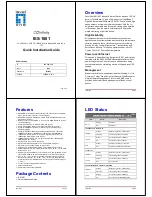
If you change all three settings to a priority of 3, and then execute
write memory
, the switch will reflect
these changes in the
show config
listing:
Figure 34: Example of show config listing with non-default priority settings in the DSCP table
Effect of
No-override
: In the QoS Type-of-Service differentiated services mode, a
No-override
assignment for the codepoint of an outbound packet means that QoS is effectively disabled for such
packets. That is, QoS does not affect the packet queuing priority or VLAN tagging.
In this case, the packets are handled as follows (as long as no other QoS feature creates priority assignments
for them):
802.1Q status
Outbound 802.1p priority
Received and Forwarded on a tagged port member of a VLAN.
Unchanged
Received on an Untagged port member of a VLAN; Forwarded on a
tagged port member of a VLAN.
0 (zero)—”normal”
Forwarded on an Untagged port member of a VLAN.
None
Note on changing a priority setting
If a QoS classifier is using a policy (codepoint and associated priority) in the DSCP Policy table, you must
delete or change this usage before you can change the priority setting on the codepoint. Otherwise the
switch blocks the change and displays this message:
Cannot modify DSCP Policy <
codepoint
> - in use by other
qos rules.
In this case, use
show qos
<classifier>
to identify the specific classifiers using the policy you want to
change; that is:
show qos port-priority
show qos vlan-priority
show qos type-of-service
For example, suppose that the 000001 (dscp 1) codepoint has a priority of 6, and several classifiers use the
000001 codepoint to assign a priority to their respective types of traffic. If you wanted to change the priority
of codepoint 000001, you would do the following:
202
Aruba 2530 Advanced Traffic Management Guide for
ArubaOS-Switch 16.09
















































